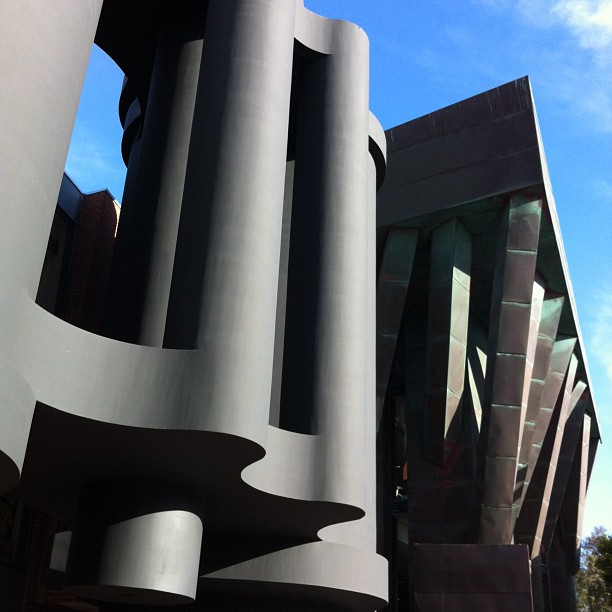One of my favorite recent pastimes has been the listening of TED talks. I can't express how much I admire this conference, the themes it tackles, the great speakers it secures, and the smart, smart move of making all the talks available for free on the web, booming its exposure to the world and making it a conference more people want to attend, not fewer. Chew on that, RIAA, MPAA and your ilk. If anything, TED should be renamed along the lines of “1000 ways to make the world a better place”, which would be much more fitting than “Technology, Entertainment and Design”.
Being a Web Architect
First published: April 28, 2009.
Updated: March 27, 2012.
For the first decade I spent working in Technology and the Web, I never really had a Job title. My roles and responsibilities varied from project to project, and I never felt like a single title would do my work justice. So it is with a certain feeling of excitement that, in 2009, I signed for a job with a clear title: “Web Architect”.
In hindsight and with a little honesty, I had very little idea what that meant. That did not stop me from giddily writing a piece on all I thought I knew about the job — the first version of the essay you are now reading. The post originally came with a list of resources, most of which I eventually found to be rubbish, irrelevant, gone, or merely outdated.
Back then, I defined the key aspects of the job as:
- Provide technical vision at every stage of the project, from feasibility to delivery.
- Build specifications and/or prototypes. Do it with a team, not alone.
- Participate in development and own responsibility of architectural consistency, quality, documentation, code reviews, testing.
- Know the methodologies and development processes and frameworks. Get teams to use the right ones for the right projects.
- Develop and maintain expertise in the team through research, exchange
- Communicate, communicate, communicate. Be a bridge between people who don’t speak the same language but need to work together.
… which is not too bad, if a little too technology-focused for my liking. The bigger problem, as I quickly found out, is that most people have even less of an idea of what a web architect is and does.
Anyone working with computers will have heard of information architects, sometimes software architects. Which is not at all what we are talking about: the former is a profession I admire, but unless reading the "polar bear" book makes you an IA, that's not what I am. The latter, well… Don't get me started.

A view of the Binocular building in Venice Beach. Architect: Frank Gehry
Most people, however, will have heard of architects, and will have a pretty clear picture in their mind about what an architect is.
Many will think of Gehry, Ando, Piano, Nouvel, Le Corbusier, Mies van der Rohe… All the heroes (and villains) of the built enviroment and their sometimes extraordinary works of (un)livable art.
My architect friends will think of hard work, long hours, obsession over detail and waking up in the middle of the night wondering if their hospital project passes requirements for the number of latrines per square meter.
I think of Christopher Alexander, the architect who formalised a new language for the sole purpose of creating buildings hand-in-hand with the people, for people to live in.
No wonder people are having trouble understanding what a web architect is, when there is a fair amount of confusion about what an architect-architect is.
So let's ask Wikipedia. As of March 2012, it defines an architect as : “a person trained in the planning, design and oversight of the construction of buildings. Etymologically, architect derives from the Latin architectus, itself derived from the Greek arkhitekton (arkhi-, chief + tekton, builder), i.e. chief builder.”
What I like about such a definition is that it does not prescribe what material is used and what the buildings are. Suppose that instead of concrete, steel and timber my raw material is a mix of information, links and online interactions, and I get a rather nice definition of a web architect: a creative strategist who initiates an idea, a scientist and technologist who develops, plans and maps it, and a team leader who oversees its delivery.
In an age of the hyperspecialized web, you can see how the breadth of this definition of a web architect means there probably won't be a lot of us whose job and role truly fit. The more technology-minded will be tech leads or software architects; those keen on planning and delivery will be producers, project managers or scrum masters; others will focus on research or strategy; and the more user-focused will find the role of product manager (or product owner as it is called in some agile setups) satisfying.
Case in point, several years after I was first called thus, through changes of roles and a change of employer my job title has changed a few times. But on good days, “Web Architect” is still what I think best describes what my professional persona — the breadth of expertise I am trying to develop — is, even if it does not always fit what I do one any given week.
Previous/Next
Have we stopped caring?
2009-04-02
Bixi on the iPhone
2009-05-16
I'm too lazy to build a real iphone app over the week-end, but I wanted to prove that it doesn't cost tens of thousands of dollars to provide bixi users mobile access to the status of the stations. 30 minutes and about as many lines of python later…